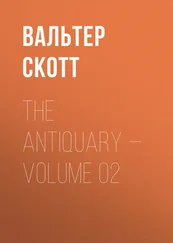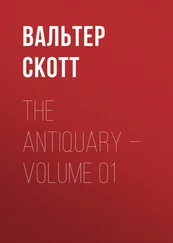Вальтер Скотт - Waverley Novels — Volume 12
Здесь есть возможность читать онлайн «Вальтер Скотт - Waverley Novels — Volume 12» — ознакомительный отрывок электронной книги совершенно бесплатно, а после прочтения отрывка купить полную версию. В некоторых случаях можно слушать аудио, скачать через торрент в формате fb2 и присутствует краткое содержание. Жанр: foreign_antique, foreign_prose, Альтернативная история, на английском языке. Описание произведения, (предисловие) а так же отзывы посетителей доступны на портале библиотеки ЛибКат.
- Название:Waverley Novels — Volume 12
- Автор:
- Жанр:
- Год:неизвестен
- ISBN:нет данных
- Рейтинг книги:5 / 5. Голосов: 1
-
Избранное:Добавить в избранное
- Отзывы:
-
Ваша оценка:
- 100
- 1
- 2
- 3
- 4
- 5
Waverley Novels — Volume 12: краткое содержание, описание и аннотация
Предлагаем к чтению аннотацию, описание, краткое содержание или предисловие (зависит от того, что написал сам автор книги «Waverley Novels — Volume 12»). Если вы не нашли необходимую информацию о книге — напишите в комментариях, мы постараемся отыскать её.
Waverley Novels — Volume 12 — читать онлайн ознакомительный отрывок
Ниже представлен текст книги, разбитый по страницам. Система сохранения места последней прочитанной страницы, позволяет с удобством читать онлайн бесплатно книгу «Waverley Novels — Volume 12», без необходимости каждый раз заново искать на чём Вы остановились. Поставьте закладку, и сможете в любой момент перейти на страницу, на которой закончили чтение.
Интервал:
Закладка:
If Alexius Comnenus thus understood the evolutions of war, he was still better skilled in those of politics, where, soaring far above the express purpose of his immediate negotiation, the Emperor was sure to gain some important and permanent advantage; though very often he was ultimately defeated by the unblushing fickleness, or avowed treachery of the barbarians, as the Greeks generally termed all other nations, and particularly those tribes, (they can hardly be termed states,) by which their own empire was surrounded.
We may conclude our brief character of Comnenus, by saying, that, had he not been called on to fill the station of a monarch who was under the necessity of making himself dreaded, as one who was exposed to all manner of conspiracies, both in and out of his own family, he might, in all probability, have been regarded as an honest and humane prince. Certainly he showed himself a good-natured man, and dealt less in cutting off heads and extinguishing eyes, than had been the practice of his predecessors, who generally took this method of shortening the ambitious views of competitors.
It remains to be mentioned, that Alexius had his full share of the superstition of the age, which he covered with a species of hypocrisy. It is even said, that his wife, Irene, who of course was best acquainted with the real character of the Emperor, taxed her dying husband with practising, in his last moments, the dissimulation which had been his companion during life. [Footnote: See Gibbon, chap. lvi.] He took also a deep interest in all matters respecting the Church, where heresy, which the Emperor held, or affected to hold, in great horror, appeared to him to lurk. Nor do we discover in his treatment of the Manichaeans, or Paulicians, that pity for their speculative errors, which modern times might think had been well purchased by the extent of the temporal services of these unfortunate sectaries. Alexius knew no indulgence for those who misinterpreted the mysteries of the Church, or of its doctrines; and the duty of defending religion against schismatics was, in his opinion, as peremptorily demanded from him, as that of protecting the empire against the numberless tribes of barbarians who were encroaching on its boundaries on every side.
Such a mixture of sense and weakness, of meanness and dignity, of prudent discretion and poverty of spirit, which last, in the European mode of viewing things, approached to cowardice, formed the leading traits of the character of Alexius Comnenus, at a period when the fate of Greece, and all that was left in that country of art and civilization, was trembling in the balance, and likely to be saved or lost, according to the abilities of the Emperor for playing the very difficult game which was put into his hands.
These few leading circumstances will recall, to any one who is tolerably well read in history, the peculiarities of the period at which we have found a resting-place for the foundation of our story.
CHAPTER THE SECOND
Othus . — This superb successor
Of the earth's mistress, as thou vainly speakest,
Stands midst these ages as, on the wide ocean,
The last spared fragment, of a spacious land,
That in some grand and awful ministration
Of mighty nature has engulfed been,
Doth lift aloft its dark and rocky cliffs
O'er the wild waste around, and sadly frowns
In lonely majesty.
Our scene in the capital of the Eastern Empire opens at what is termed the Golden Gate of Constantinople; and it may be said in passing, that this splendid epithet is not so lightly bestowed as may be expected from the inflated language of the Greeks, which throws such an appearance of exaggeration about them, their buildings, and monuments.
The massive, and seemingly impregnable walls with which Constantine surrounded the city, were greatly improved and added to by Theodosius, called the Great. A triumphal arch, decorated with the architecture of a better, though already a degenerate age, and serving, at the same time, as a useful entrance, introduced the stranger into the city. On the top, a statue of bronze represented Victory, the goddess who had inclined the scales of battle in favour of Theodosius; and, as the artist determined to be wealthy if he could not be tasteful, the gilded ornaments with which the inscriptions were set off, readily led to the popular name of the gate. Figures carved in a distant and happier period of the art, glanced from the walls, without assorting happily with the taste in which these were built. The more modern ornaments of the Golden Gate bore, at the period of our story, an aspect very different from those indicating the "conquest brought back to the city," and the "eternal peace" which the flattering inscriptions recorded as having been extorted by the sword of Theodosius. Four or five military engines, for throwing darts of the largest size, were placed upon the summit of the arch; and what had been originally designed as a specimen of architectural embellishment, was now applied to the purposes of defence.
It was the hour of evening, and the cool and refreshing breeze from the sea inclined each passenger, whose business was not of a very urgent description, to loiter on his way, and cast a glance at the romantic gateway, and the various interesting objects of nature and art, which the city of Constantinople presented, as well to the inhabitants as to strangers. [Footnote: The impression which the imperial city was calculated to make on such visitors as the Crusaders of the West, is given by the ancient French chronicler Villehardouin, who was present at the capture of A. D. 1203. "When we had come," he says, "within three leagues, to a certain Abbey, then we could plainly survey Constantinople. There the ships and the galleys came to anchor; and much did they who had never been in that quarter before, gaze upon the city. That such a city could be in the world they had never conceived, and they were never weary of staring at the high walls and towers with which it was entirely encompassed, the rich palaces and lofty churches, of which there were so many that no one could have believed it, if he had not seen with his own eyes that city, the Queen of all cities. And know that there was not so bold a heart there, that it did not feel some terror at the strength of Constantinople." — Chap. 66.
Again, — "And now many of those of the host went to see Constantinople within, and the rich palaces and stately churches, of which it possesses so many, and the riches of the place, which are such as no other city ever equalled. I need not speak of the sanctuaries, which are as many as are in all the world beside." — Chap. 100.]
One individual, however, seemed to indulge more wonder and curiosity than could have been expected from a native of the city, and looked upon the rarities around with a quick and startled eye, that marked an imagination awakened by sights that were new and strange. The appearance of this person bespoke a foreigner of military habits, who seemed, from his complexion, to have his birthplace far from the Grecian metropolis, whatever chance had at present brought him to the Golden Gate, or whatever place he filled in the Emperor's service.
This young man was about two-and-twenty years old, remarkably finely-formed and athletic — qualities well understood by the citizens of Constantinople, whose habits of frequenting the public games had taught them at least an acquaintance with the human person, and where, in the select of their own countrymen, they saw the handsomest specimens of the human race.
These were, however, not generally so tall as the stranger at the Golden Gate, while his piercing blue eyes, and the fair hair which descended from under a light helmet gaily ornamented with silver, bearing on its summit a crest resembling a dragon in the act of expanding his terrible jaws, intimated a northern descent, to which the extreme purity of his complexion also bore witness. His beauty, however, though he was eminently distinguished both in features and in person, was not liable to the charge of effeminacy. From this it was rescued, both by his strength, and by the air of confidence and self-possession with which the youth seemed to regard the wonders around him, not indicating the stupid and helpless gaze of a mind equally inexperienced, and incapable of receiving instruction, but expressing the bold intellect which at once understands the greater part of the information which it receives, and commands the spirit to toil in search of the meaning of that which it has not comprehended, or may fear it has misinterpreted. This look of awakened attention and intelligence gave interest to the young barbarian; and while the bystanders were amazed that a savage from some unknown or remote corner of the universe should possess a noble countenance bespeaking a mind so elevated, they respected him for the composure with which he witnessed so many things, the fashion, the splendour, nay, the very use of which, must have been recently new to him.
Читать дальшеИнтервал:
Закладка:
Похожие книги на «Waverley Novels — Volume 12»
Представляем Вашему вниманию похожие книги на «Waverley Novels — Volume 12» списком для выбора. Мы отобрали схожую по названию и смыслу литературу в надежде предоставить читателям больше вариантов отыскать новые, интересные, ещё непрочитанные произведения.
Обсуждение, отзывы о книге «Waverley Novels — Volume 12» и просто собственные мнения читателей. Оставьте ваши комментарии, напишите, что Вы думаете о произведении, его смысле или главных героях. Укажите что конкретно понравилось, а что нет, и почему Вы так считаете.












